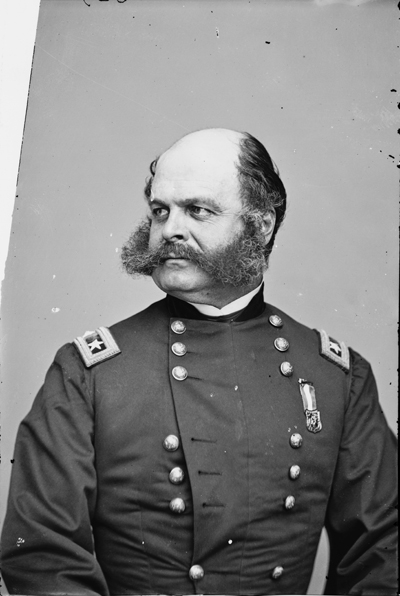Ambrose E. Burnside
Featured Character – 1861-1862

Ambrose Burnside
Courtesy of the U.S. Library of Congress
Ambrose E. Burnside was born in 1824 in Indiana to a poor family of Quakers. He attended and graduated from West Point in 1847 and was sent to the Mexican War, where he arrived too late and was instead stationed in New Mexico. In 1852 he resigned from his post to move to Rhode Island, where he found himself in debt after failing to obtain a government contract for his invention, the Burnside breechloading rifle. He had a number of occupations, including a position with the Illinois Central Railroad and an office treasurer in New York City. At the start of the Civil War, Burnside led a Rhode Island regiment to Washington in April 1861 and was made brigadier general after the Battle of First Bull Run on July 21 of that year. Burnside led an expedition on the North Carolina coast and was successful in capturing Roanoke Island, New Bern, Beaufort, and Fort Macon, for which he was promoted to major general in March of 1862. While in this position, Burnside was offered command of the Army of the Potomac twice, but he declined, feeling himself incompetent. However, when President Lincoln relieved George B. McClellan of that post, Burnside was appointed to the position in November 1862. A month later, this army was defeated at Fredericksburg. After the failure of the Mud March campaign in January 1863, Lincoln relieved Burnside of command and sent him to the Western Theater, where he captured Knoxville and occupied eastern Tennessee before returning east to participate in the battles of Wilderness, Spotsylvania, and Cold Harbor, plus the siege at Petersburg. When Burnside failed at an attack there, he was charged and found guilty for disobedience of orders and in April 1865, he resigned from the army. After the war Burnside became governor of Rhode Island three times, and from 1875 until his death in 1881, he was a United States Senator.